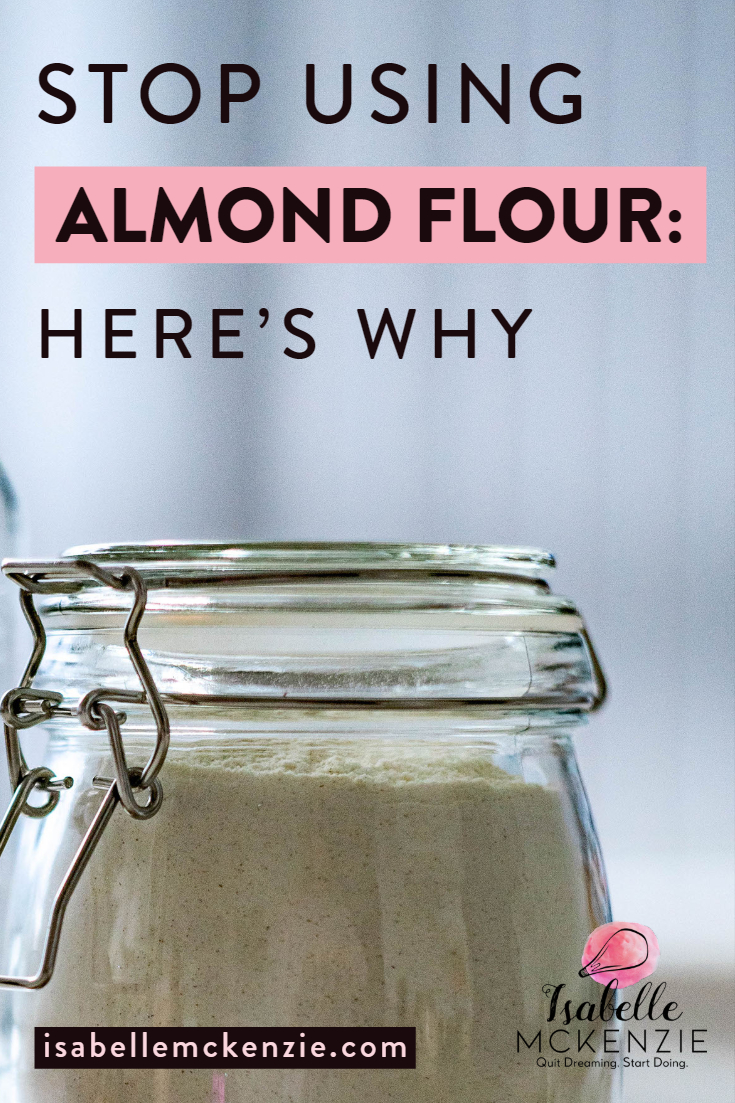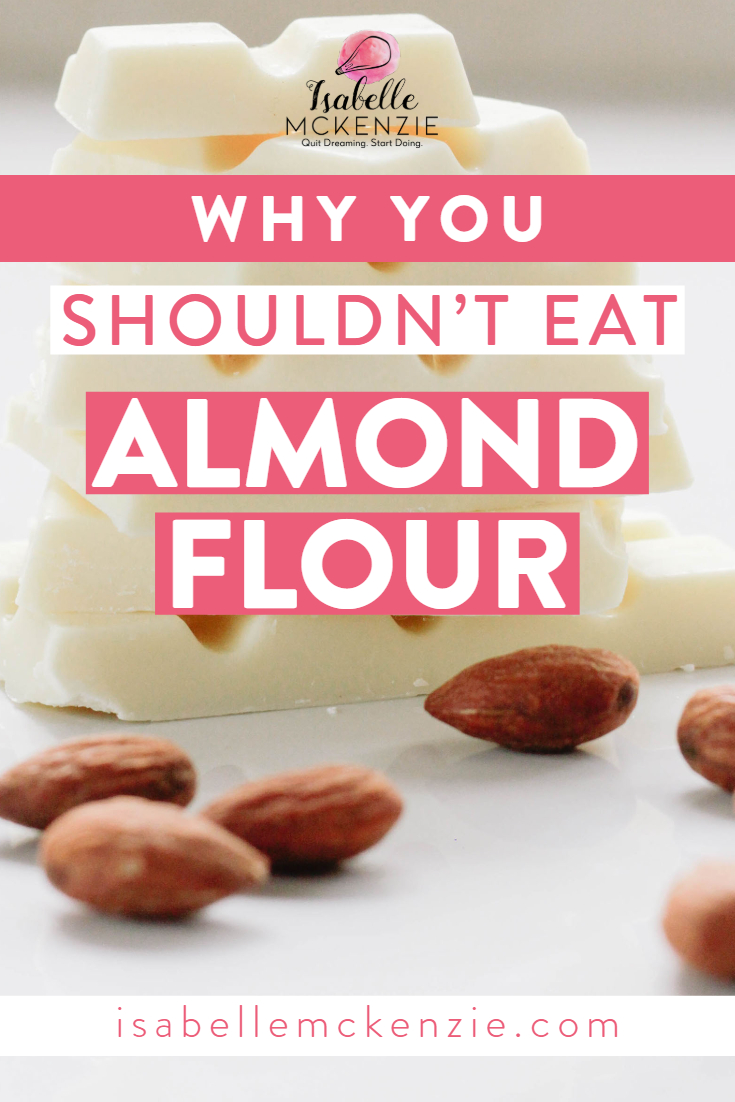You Should Stop Using Almond Flour: The 7 Secret Reasons Why
You Should Stop Using Almond Flour: The 7 Secret Reasons Why
Is almond flour hurting your health? The answer is actually a tad bit complicated , but after hitting some science articles and blogs I’ve simplified some important concerns that relate to the decision you should make regarding the flour, so you can make a fully educated choice to avoid almond flour or choose to use almond flour with moderation.
PANCAKES. I LOVE pancakes. I love the way the taste, how they pair with jam, and that they’re so easy to make. The problem is, I try to stay away from gluten. This meant that, for a long time, I couldn’t have them very often.
Cue almond flour.
When I finally decided to try almond flour, it became a HUGE staple for me; not only for my pancake addiction 😉, but also for cupcakes, breads, and other baked goods (which are all very popular foods in my house). I could bake to my heart’s content, and without the negative side effects that I suffer from gluten flour (bloating, tiredness, etc.).
But here’s the thing: I’ve decided to give almond flour up.
Why? Well, *mysterious voice* it turns out almond flour has a couple bad secrets…
Recently, when I was wandering around the kitchen getting ready to bake while talking to my mum and a friend, mum brought up an interesting point regarding the almond flour I had just put on the counter. She said, that morning, she had read an article about ‘inflammatory high omega-6 levels in almond flour’ and some apparent health issues that can be caused by almond flour (yup, morning health news reading is a thing in my house 😀).
Anyway, a little bit unnerved by this, I still pressed on with my cookie-making.
However, later that day and still freaked out I, of course, decided to sit down and do some good, old-fashioned research. Can you tell I like to study? 🤭
Was almond flour as bad as I had started to suspect?
The answer is actually a tad bit complicated and ‘sciency’ (lots to consider), but after hitting some science articles and blogs (science is not my best subject 🔬), I’ve managed to simplify some important concerns that relate to the decision you should make regarding the flour, so you can make a fully educated choice to avoid almond flour or choose to use almond flour with moderation.
At the end, I’ll give you my simplified answer. Alright, let’s get analysing! 😊
1. Almond Flour = Inflammation
Almond flour is high in Omega-6’s, which causes inflammation when eaten in large amounts or when eaten out of proportion to the right omega 6/omega 3 ratio.
BUT, the fact is that pretty much all varieties of nuts and seeds are very high in omega-6 fatty acids (with the exceptions being coconut, macadamia nut, and walnut). When you choose to consume any nuts or seeds, whole or in the form of flour, it’s important to balance that omega-6 intake with plenty of seafood.
2. Almond Flour Is Deceptive
Get this: a single cup of almond flour contains around 90 almonds!
Almond flour disguises the consumption of the nuts.
If you were actually chewing the whole almonds, your body would tell way before you consumed 90 almonds that you were full. The point is that your body loses perception of the actual portions of almonds you’re eating when the are cooked in their almond flour form.
HOWEVER, this kind of applies to all flours. 🥞
Anything you make with any flour or substitute, be it wheat or nut, is going to be easier to eat than if you were eating the food whole. This is because they’re more consumable, meaning they all affect your hunger signals and lead you to eat more.
In summary, this isn’t really a good argument against almond flour, just flour in general.
3. Almond Flour Is High In Oxalates
Oxalates: an anti-nutrient found in many vegetables, nuts (ALMONDS, but not all almonds), seeds, and grains. Oxalic acid binds to minerals and this prevents the minerals from being absorbed in the body. Yup, get your scientist goggles on.
The problem with a high intake of oxalate-rich food is that it might contribute to calcium oxalate crystal formation, which, is a major component to some kinds of kidney stone. Also, it’s been implicated in gout, and also has been associated with microcrystalline-associated arthritis.
Normally, if you’ve been diagnosed with kidney stones, you would also have been recommended consume a low-oxalate, low protein diet. But hold up, research isn’t supporting these recommendations.
Instead, science is starting to shine a light on new factors of kidney diseases such as high fructose intake.
It’s also starting to show that higher oxalate diets might reduce your chances of kidney stones (😕 wait, what?).
That assumption aside, when you’ve already developed kidney stones, low oxalate diets don’t actually seem to help (urine oxalate content which has been used to assess kidney stone risk doesn’t actually appear to correlate).
On the other hand, it seems increasing calcium as well as eating extra fruits and vegetables might actually provide the real help.
Some really interesting facts there, huh…!?
Let’s take all that into consideration and continue on.
4. Fats In Almond Flour Are NOT Heat Stable
When I first read this I was puzzled. Really puzzled. But, according to what I read, almond flour is not heat stable.
Essentially, oxidized fats (like those in large amounts of cooked almond flour) are consumed, our body becomes depleted of antioxidants, causing damage our body cells. There are some more technical reasons, but explaining them to you clearly is probably a bit above my pay grade 🧐 (plus, I don’t wanna bore ya)!
Luckily, after reading up, I found an update that showed research to prove the first bit of research I found wrong, arguing that this only applies to cooking with almond oil. So, have a think, but don’t worry too much.
5. Almonds Contain Large Amounts Of Toxin
This is actually a really good reason to limit or stop consuming almonds (in all forms, even almond butter). I won’t get too much into the details, but here goes:
Almonds contain a particularly larger amount of cyanogenic glycosides than other plants which also contain them.
This means they can be highly toxic: hydrogen cyanide is actually released from cyanogenic glycosides when plants that contain them are eaten. 😨 Not good news.
6. Enzyme Inhibitor Content
All nuts and seeds have concentrated Enzyme inhibitor, and of course as a result, almond flour contains a significant amount.
If you don’t know, Enzyme inhibitors are problematic for digestion.
When we consume and digest enzyme inhibitors, our own digestive enzymes can’t complete their job properly. 🥜
This means consumption of nuts and seeds often causes bloating and stomach pain.
If you really LOVE nuts and seeds (in all forms), I suggest you soak them first to denature most of the enzyme inhibitors.
7. Coconut Flour Can Be Healthier
Now, there are many arguments to make on this subject. Not all people agree that coconut flour is a better substitute.
Let’s begin with the arguments for coconut. 🥥
Coconut’s fats are more heat stable; however this doesn’t really count because almond flour isn’t as heat unstable as people think (as I talked about above).
Yet, you could argue that, with coconut flour, a little goes a long way. And it’s totally true.
Because coconut flour has a great ability to absorb liquid, you can use less of it in a batch of food.
The only problem is that because coconut flour is so great at absorbing, it makes it extremely high in inulin fiber. Inulin is a FODMAP (Fermentable Oligo-, Di-, Mono-saccharides And Polyols) and could be a problem for people dealing with SIBO, leaky gut, FODMAP-intolerance, and IBS.
Whether you suffer from one of these issues or not, I suggest limiting yourself to 2-4 tablespoons of coconut flour per day at most, because too much fiber in one day isn’t good for your health.
So, now we’ve been through quite a few pros and cons, I’ll sum it all up (as promised).
Almond flour should be used in quite a bit of moderation.
Maybe just have one almond flour treat a month or strictly use it for special occasions.
Try giving your body a break from almond flour for a while and see if eating almond flour has been making you feel worse; if you feel more energetic or have less pain and inflammation, then eat less of it or don’t eat it all.
This is especially true if you have any inflammatory or autoimmune issues.
Personally, I don’t use any almond flour anymore, and now just limit myself to the occasional coconut flour treat (pancakes anyone 😁). I’m not gonna lie, I do feel better for it!



























… yup, the Isabelle behind the IsabelleMcKenzie.com!
Instagram: @ItsIsabelleM | Pinterest: @ItsIsabelleM | Subscribe on Youtube
I’m dedicated to helping teach people how to live their happiest, healthiest life and reach their goals so that they can create the lifestyle of their dreams with integrity & purpose.
I focus on self-care, mind, body and health, dedicated to helping teach peeps how to live their happiest, healthiest life and reach their goals so that they can create the life that will have them jumping out of their bed in the morning to actually live!
Read More >